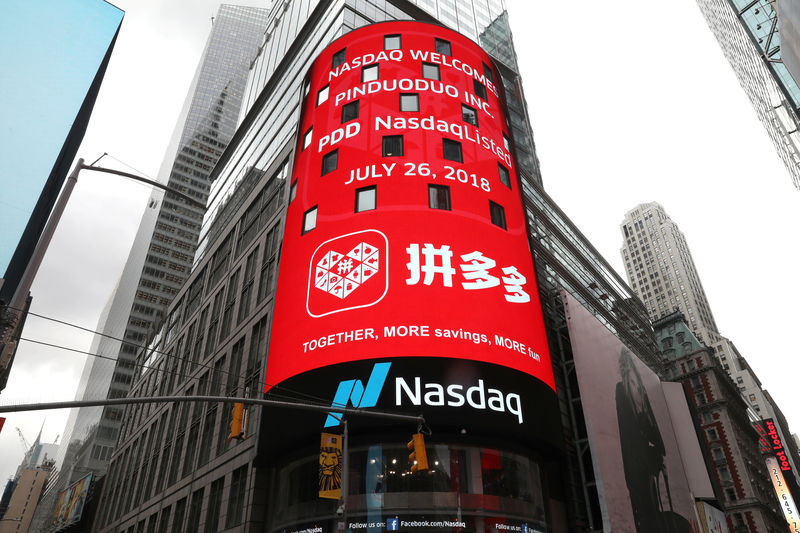Temu owner PDD Holdings missed market expectations for its quarterly revenue on Monday, and downbeat comments from executives about the competitive landscape in China’s domestic e-commerce sector and the company’s global outlook caused its shares to drop by more than 28%.
This marked the largest single-day decline in PDD’s stock since its U.S. listing in 2018, wiping out nearly $55 billion in market capitalization. The e-commerce company runs discount-focused platforms Pinduoduo (NASDAQ:) in China and Temu for the international market.
“We are seeing many new challenges ahead, from changing consumer demand, intensifying competition and uncertainties in the global environment,” Co-Chief Executive Chen Lei said during an earnings call with analysts.
“We will enter a new phase of high-quality development that calls for increased investments and our profitability will be affected as a result.”
PDD Holdings Inc DRC (NASDAQ:) reported second-quarter revenue of 97.06 billion yuan ($13.64 billion), falling short of analysts’ expectations of 100 billion yuan, according to LSEG data.
Operating expenses surged by 48% in the quarter ending June 30, as the company ramped up spending on marketing, advertising, and promotions to draw in shoppers. General and administrative costs more than tripled to 1.84 billion yuan, driven by staff-related expenses.
While Pinduoduo’s low prices and significant discounts on a wide range of products have appealed to budget-conscious consumers, major competitors like Alibaba (NYSE:) and JD (NASDAQ:).com have also launched aggressive promotions on their platforms, intensifying competitive pressures on PDD.
China’s fragile economy, ongoing weakness in the property sector, and high youth unemployment rates have led consumers to reduce spending, impacting the country’s retail and e-commerce sectors and fueling fierce competition for market share among e-commerce giants.
What analysts say about PDD stock after disappointing earnings
Following PDD’s report release, analysts at Macquarie downgraded the stock to Neutral to reflect “diminishing earnings visibility.”
“The negative surprise was management’s conservative comments towards the industry’s competitive dynamics, suggesting a heightened investment cycle ahead. We acknowledge PDD’s history of significant earnings volatility, but note that lower financial visibility could further reduce valuation multiples.
Citi analysts also cut their rating on the stock from Buy/High Risk to Neutral/High Risk.
“Given limited investor communication and the lack of operating metrics and financial breakdown disclosure, together with management’s intentional/proactive cautious outlook comment, the stock will likely be range bound until PDD is able to regain investor confidence through few quarters of consistent result beat.”
Meanwhile, other Wall Street firms shared somewhat more positive views.
JPMorgan: “While its financial visibility indeed worsens with the re-investment message, we don’t believe the magnitude of investments in the coming quarters will derail PDD from double-digit profit growth, on the back of continuous market share gain in China and Temu turning profitable on top of fast growth. Its valuation has dropped back to 8x/6.5x 2024E/25E P/E , which already suggests an ex. Growth scenario, in our view. We would accumulate the stock into the weakness and wait for US election result to clear the uncertainty for Temu, and the 3Q24 result in late November to ease concerns about China domestic growth.”
Benchmark: “We recognize the increased risk factors but believe that PDD’s fundamentals are not broken. Despite the shift from a “beat and raise” narrative to a more uncertain outlook, PDD should continue to gain market share domestically, albeit at a slower pace, with promising international growth potential. With the stock trading at less than 10x our FY24 earnings estimate, we think the market is overreacting.”
Bernstein: “PDD’s guidance for lower profits has driven a sharp sell-off today. But we couldn’t help but wonder if the company’s messaging was meant for more than just investors. A PDD platform friendlier to merchants and investing in supply-side quality ought to become more formidable and adept at taking share from peers. Even on reduced estimates taking management’s guidance at face value, PDD’s stock now trades on c. 7x 2025E PE… lower than Alibaba and JD where valuation multiples reflect fears of share loss and non-growth.”
Read the full article here
















